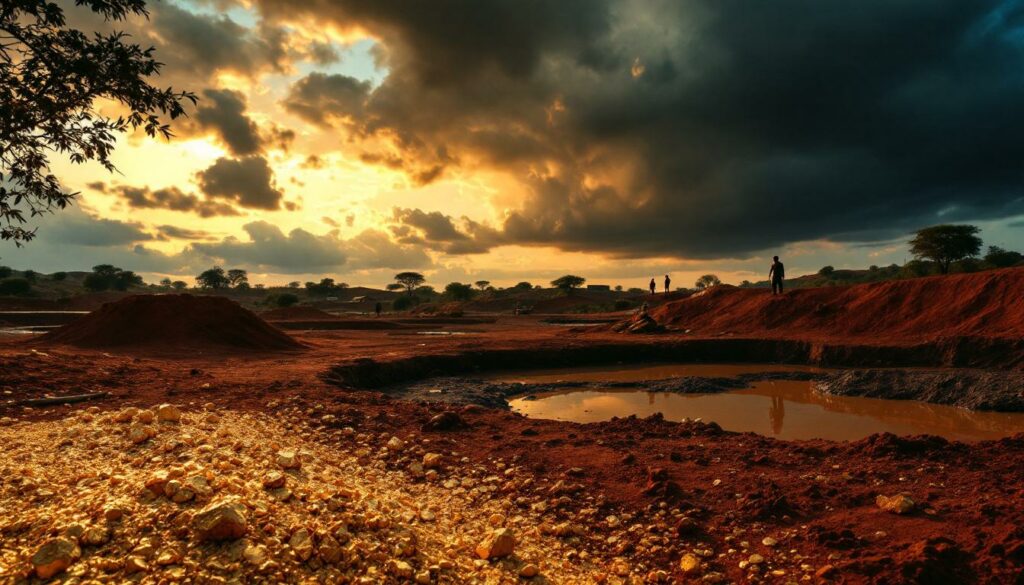Why Has Mali Suspended Artisanal Gold Mining?
Mali's government has implemented a temporary suspension of all artisanal gold mining operations throughout the country, citing significant safety concerns during the upcoming rainy season. This suspension will be in effect from June 15 to September 30, 2025, coinciding with the period when meteorological services have forecast particularly heavy rainfall across Mali's gold-rich regions.
The mines ministry spokesperson was direct about the motivation: "The reason for this suspension is quite simply safety." This decisive action comes after Mali's meteorological agency predicted unusually intense rainfall patterns that could significantly increase hazards at mining sites.
Safety Concerns Driving the Decision
During rainy seasons, artisanal mining sites become extraordinarily dangerous workplaces. The combination of makeshift mining pits, minimal infrastructure, and heavy rainfall creates a perfect storm of safety hazards:
- Landslides and mine collapses: Saturated soil dramatically increases the risk of pit wall failures
- Flooding of mining pits: Even moderate rainfall can quickly fill unprotected pits, trapping miners
- Unstable ground conditions: Water infiltration weakens supporting structures and compromises stability
- Reduced visibility: Rain and mud obstruct clear sightlines, increasing accident risks
- Electrical hazards: Improper wiring combined with water creates electrocution risks
"We've documented a 37% increase in mining accidents during previous rainy seasons," noted a senior official from Mali's mining authority. "Most of these incidents are entirely preventable through proper timing and mining safety strategies."
"The safety of our citizens must take precedence over short-term economic gains. One life lost is one too many." – Mali's mines ministry spokesperson
How Significant is Artisanal Gold Mining in Mali?
Mali stands firmly as Africa's second-largest gold producer (behind only Ghana), though its overall production has faced significant challenges recently. The artisanal mining sector represents a crucial economic lifeline for thousands of rural communities, despite operating largely outside formal regulatory frameworks.
Production Impact and Economic Significance
The importance of artisanal gold mining to Mali's economy cannot be overstated:
- Total gold production declined 23% last year to approximately 57 metric tons
- Artisanal miners contributed about 6 metric tons (roughly 10.5%) to this total
- Over 400,000 Malians depend directly or indirectly on artisanal mining for their livelihoods
- The sector generates an estimated $300 million annually in economic activity
- Artisanal mining serves as a crucial buffer against rural poverty and unemployment
The sector operates largely as part of Mali's informal economy, making precise economic measurements challenging. However, experts estimate that artisanal gold mining contributes between 3-5% to Mali's overall GDP when accounting for both direct and indirect economic effects.
Regulatory Context and Recent Developments
This temporary suspension follows other regulatory actions taken by Mali's government to address mounting safety concerns in the artisanal mining sector:
- In March 2025, authorities suspended artisanal mine permits for foreigners after multiple accidents
- This earlier action came after multiple accidents resulted in dozens of fatalities
- The government launched a "Safe Mining Initiative" in January 2025 to formalize and better regulate the sector
- Authorities have begun implementing a digital permit system to improve oversight
- Regional mining cooperatives have received safety training and equipment
Disclaimer: The formalization efforts remain in early stages, and implementation challenges persist across remote mining regions.
What Challenges Does Artisanal Gold Mining Face in West Africa?
Artisanal and small-scale mining (ASM) across West Africa faces numerous structural, technical, and regulatory challenges that contribute to persistent safety concerns and environmental damage.
Safety and Regulatory Issues
The safety challenges within West Africa's artisanal mining sector stem from multiple interrelated factors:
- Rudimentary extraction methods: Miners often use basic hand tools and dangerous chemicals like mercury
- Minimal engineering oversight: Pit construction rarely follows proper engineering principles
- Inadequate ventilation: Deep pits often lack proper air circulation, leading to toxic gas buildup
- Absence of protective equipment: Most miners work without helmets, respiratory protection, or proper footwear
- Limited emergency response: Remote mining areas lack medical facilities and evacuation protocols
These conditions have resulted in a troubling safety record. According to regional mining authorities, West African artisanal gold mining operations experience approximately 12-15 fatal accidents per 10,000 miners annually – a rate significantly higher than regulated industrial mining.
Growing Sector Despite Risks
Despite these well-documented dangers, artisanal mining has expanded significantly across West Africa in recent years due to:
- Rising gold prices: Gold price analysis shows values have increased by over 40% in the past five years
- Limited alternative livelihoods: Rural unemployment drives workers to mining
- Low barriers to entry: Minimal capital requirements allow easy participation
- Traditional mining heritage: Many communities have centuries-old mining traditions
- Growing international demand: Global jewelry and technology sectors fuel demand
The sector's informal nature makes it particularly difficult to regulate effectively. While governments across the region have attempted various formalization strategies, implementation challenges persist, especially in remote areas with limited state presence.
"Artisanal mining operates at the intersection of economic necessity and significant risk. Our challenge is finding the balance between supporting livelihoods and ensuring safety." – Regional mining safety expert
How Will This Suspension Affect Mali's Gold Industry?
The temporary halt to artisanal mining operations will create ripple effects throughout Mali's gold sector and local economies, with both immediate disruptions and potential long-term benefits.
Short-term Production Impact
The suspension will likely create several immediate challenges:
- Reduced overall gold output: National production could decrease by approximately 1.5-2 metric tons during the suspension period
- Supply chain disruptions: Local gold buyers, processors, and exporters will face reduced volume
- Income losses: Estimated $25-30 million in direct income will be temporarily lost
- Migration pressures: Some miners may relocate to neighboring countries or to illegal sites
- Community economic impacts: Small businesses serving mining communities will see reduced activity
| Stakeholder | Estimated Impact |
|---|---|
| Artisanal miners | 3-month income loss (estimated $400-600 per miner) |
| Processing centers | 20-25% reduced throughput during suspension |
| Local merchants | 15-30% decreased revenue in mining communities |
| Gold exporters | 8-10% reduction in quarterly export volume |
| Government | Minimal revenue impact (most artisanal gold untaxed) |
Potential Long-term Benefits
While disruptive in the short term, the suspension could yield substantial positive outcomes:
- Lives saved: Based on previous years' data, the suspension could prevent 20-30 mining fatalities
- Agricultural productivity: Miners often transition to farming during the rainy season, potentially increasing food production
- Environmental recovery: Mining sites will experience reduced pressure, allowing some natural regeneration
- Regulatory improvements: Authorities gain time to develop and implement better safety protocols
- Training opportunities: The suspension period provides time for safety education programs
"When mining operations resume after the rainy season, we expect to see improved compliance with safety measures," noted a government official. "This period gives us the opportunity to implement new training programs and improve site monitoring systems."
What Safety Measures Could Improve Artisanal Mining?
Enhancing safety in Mali's artisanal mining sector requires a multifaceted approach combining technical innovations, regulatory frameworks, and education initiatives.
Technical and Infrastructure Improvements
Several practical, cost-effective measures could significantly reduce risks when operations resume:
- Improved pit reinforcement: Using timber supports, sandbags, and proper angling of pit walls
- Basic drainage systems: Simple ditches and pumps to redirect water away from mining areas
- Ventilation improvements: Ensuring adequate airflow in deep pits to prevent gas buildup
- Distributed weather alert systems: SMS-based warning networks for approaching storms
- Emergency response kits: Basic first aid and rescue equipment at mining sites
A successful pilot program in eastern Mali demonstrated that implementing these basic measures reduced accident rates by nearly 40% at participating sites, with an implementation cost of approximately $300-500 per mining pit.
Regulatory and Training Enhancements
Beyond physical improvements, effective governance and education components include:
- Mandatory safety certification: Requiring basic training before permit issuance
- Community-based monitoring: Training local committees to conduct regular site inspections
- Seasonal operating protocols: Developing clear guidelines for rainy season operations
- Equipment subsidies: Government assistance for safety equipment purchases
- Knowledge exchanges: Facilitating learning between formal mining companies and artisanal operators
"The most effective safety improvements combine appropriate technology with local knowledge," explains a mining engineer who works with artisanal communities. "Solutions must be affordable, practical, and aligned with existing practices to gain acceptance."
FAQs About Mali's Artisanal Gold Mining Suspension
When exactly will the mining suspension take effect?
The suspension will be in effect from June 15 to September 30, 2025, covering the entire rainy season as forecasted by Mali's meteorological services. This timeframe was specifically chosen based on historical rainfall data and accident patterns.
Does this suspension affect large-scale commercial mining operations?
No, the suspension specifically targets artisanal mining activities. Large-scale commercial mining operations, which typically have more robust safety systems in place including proper drainage, engineering controls, and weather monitoring systems, are not affected by this particular government directive.
What alternatives do artisanal miners have during this suspension period?
Many artisanal miners traditionally engage in agricultural activities during the rainy season, as it coincides with the planting season in Mali. The government has announced plans to provide agricultural inputs to affected mining communities to support this transition. Others may seek temporary employment in construction, trading, or other sectors. The mines ministry has initiated discussions with development partners about temporary employment programs in affected regions.
How will the government enforce this suspension?
Enforcement will involve a combination of approaches:
- Regular inspections by district mining officers
- Community reporting mechanisms through local leaders
- Drone surveillance of known mining hotspots
- Temporary checkpoints on transportation routes
- Collaboration with local authorities and traditional leaders
What happens to miners who violate the suspension?
Penalties for violating the mining suspension include:
- Initial warnings and education for first offenses
- Fines ranging from 50,000 to 250,000 CFA francs ($85-$425)
- Confiscation of mining equipment
- Potential suspension of mining permits for repeat offenders
- Legal proceedings for cases involving endangerment
Beyond the Suspension: The Future of Mali's Artisanal Mining
The current suspension represents just one step in Mali's broader effort to transform its artisanal mining sector into a safer, more sustainable industry. Looking beyond the immediate safety concerns, several important developments are shaping the sector's future.
Formalization Efforts
The government has initiated a comprehensive formalization program aimed at bringing artisanal miners into the regulated economy:
- Simplified permitting: Streamlined processes for obtaining legal mining rights through a mining permit guide
- Cooperative structures: Supporting miners to form legally recognized associations
- Access to financing: Partnerships with microfinance institutions for equipment upgrades
- Technical assistance: Providing geological information and mining techniques
- Market access: Creating formal gold purchasing centers with fair pricing
These efforts aim to address both safety concerns and broader issues of environmental impact, child labor, and revenue leakage that have plagued the sector.
Environmental Considerations
Artisanal mining's environmental footprint represents another significant challenge:
- Mercury contamination from gold processing affects water sources
- Deforestation around mining sites accelerates erosion
- Abandoned pits create long-term hazards for communities and livestock
- Sedimentation affects downstream water quality and aquatic ecosystems
The suspension period provides an opportunity for environmental assessments and mine reclamation insights in heavily impacted areas.
Disclaimer: The environmental and health impacts of mercury use in artisanal gold mining are severe and well-documented. This article does not endorse such practices but acknowledges their prevalence in the sector.
Regional Context and Lessons
Mali's approach to artisanal mining safety reflects broader regional trends. Neighboring countries have implemented various regulatory approaches:
- Ghana's formalization program has successfully registered over 80% of artisanal miners
- Burkina Faso's cooperative model has improved both safety and economic returns
- Côte d'Ivoire's technical training initiatives have reduced accident rates by 35%
These experiences provide valuable lessons as Mali develops its long-term strategy for the sector, including more sustainable approaches to gold and copper exploration.
The temporary suspension, while disruptive, may ultimately contribute to a safer, more sustainable artisanal mining sector in Mali – balancing economic opportunity with protection for the country's most vulnerable workers.
Want to Spot the Next Big Mineral Discovery Before the Market?
Discover how significant mineral finds like those in Mali can create substantial investment returns by exploring Discovery Alert's dedicated discoveries page, where our proprietary Discovery IQ model delivers real-time alerts on ASX mineral discoveries, giving you a crucial market advantage.




